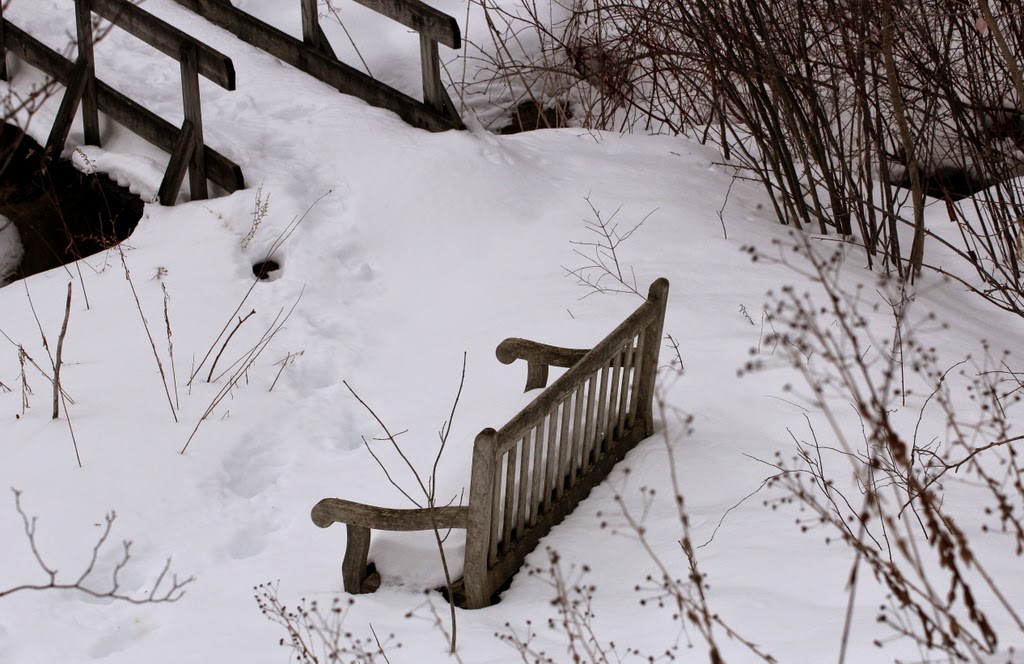The temperature has begun its descent to below zero yet again. Snow hides the layer of ice beneath it, and more snow has begun to fall. December was benign, but the second half of November,
January, and now February have all been very cold, snowy, and generally grim.
Fortunately, what I hear does not match what I see.
As I do every year in February, I recently went to the Holden Arboretum in NE Ohio’s Lake County, listening to the first signs of spring. I saw on the OhioBirds listserv that there were Red-winged Blackbirds behind the visitor center, which is the first place I hear them every year. A few may have overwintered in relative quiet, but the birds that were reported apparently were quite audible about their presence. I had to go hear for myself.
As I do every year in February, I recently went to the Holden Arboretum in NE Ohio’s Lake County, listening to the first signs of spring. I saw on the OhioBirds listserv that there were Red-winged Blackbirds behind the visitor center, which is the first place I hear them every year. A few may have overwintered in relative quiet, but the birds that were reported apparently were quite audible about their presence. I had to go hear for myself.
Yes, indeed
– they were loudly and defiantly present in spite of the cold temperatures and
snow cover. But listen – who else was
talking and maybe even singing?
A Red-bellied
Woodpecker, the usual little flock of House Sparrows, American Crows…
Here’s
another recording from that same location.
Did you hear
a Tufted Titmouse singing a little farther back in the texture? I know that particular two-note tune. It’s a Titmouse song I’ve only heard at
Holden. Here’s a recording of that same
song from Holden four years earlier: 2-22-11.
I imagine
you can hear that they are almost identical, but I’ll put them back to back.
What else is
going on in this recording?
This is the
first place I hear singing Song Sparrows each year, and I expect to hear them in
February. Sure enough – two were singing
already!
And what
about House Finches? They start singing
all over our area at the end of January, and they are often the first birds I
hear sing in the new year. I’ve written
about these late winter singers here, though, so let’s listen instead to what
they say when they’re not actually singing.
House Finch calls sound to me as if they talking. I was able to get fairly close to a female who was commenting extensively, and I think you may be able to learn to recognize their calls. I’ll include a sonogram so you can see the sounds.
Black-capped
Chickadees were calling as well. They
weren’t singing, but Chickadees always seem to have a lot to say.
Of course, there’s the usual “Chick-a-dee-dee-dee,” but they have an assortment of other comments as well. Here’s a few I heard in rapid succession, and I’ll include a sonogram for this as well. Some of those pitches are quite high!
The area
behind the visitor center has both a butterfly garden with shrubs nearby and a
lower, wet area with a tiny stream flowing from the butterfly garden’s pool
into the large pond nearby. There’s a park bench and a
little bridge that puts me at the edge of the Red-winged
Blackbird’s winter home.
There are other birds in this sheltered area as
well: Dark-eyed Juncos, House Finches, Goldfinches, and the little group of House Sparrows. But I'm hearing some additional calls, and I'd like to get a better listen.
At this point, I invite you to picture me on my knees in the snow with my shotgun microphone. Its base was supported on the bridge as I tried to pick up the sounds from the inaccessible area below and beyond me.
At this point, I invite you to picture me on my knees in the snow with my shotgun microphone. Its base was supported on the bridge as I tried to pick up the sounds from the inaccessible area below and beyond me.
Do you
recognize the calls? They’re birds that
nest far north of Ohio. Sometimes their
calls are lighter and a little higher than the birds in this group, but I think
they’re still distinctive.
Tree
Sparrows. I always find these beauties here in the winter, and they will be the
topic of my next post.
Until then,
listen for the birds that have started singing and make note of each new
species you hear. See if you can
identify the calls, too – there’s not a lot of bird song yet, so this is a good
time to listen for the details.
When the
temperatures are so bitterly cold, sounds of hope are like warm, spring
sunshine.











Hi, Lisa. I was out this morning in 14 degree F temperatures and 20 mph winds, cleaning a few inches of new snow from the driveway. All the time I was working, I was enjoying the bird songs. It didn't feel like February, but it certainly sounded like it.
ReplyDeleteThanks!
ReplyDeleteThese are such wonderful recordings and observations. We need more marriage of the arts and nature. Have you composed any music based on the sounds of nature? If you have, I'd love to see you mention it as a comment on my philosophy of nature blog at Cereflections.com
ReplyDelete